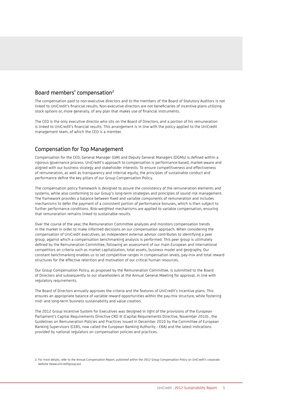
Board members’ compensation2
The compensation paid to non-executive directors and to the members of the Board of Statutory Auditors is not
linked to UniCredit’s financial results. Non-executive directors are not beneficiaries of incentive plans utilizing
stock options or, more generally, of any plan that makes use of financial instruments.
The CEO is the only executive director who sits on the Board of Directors, and a portion of his remuneration
is linked to UniCredit’s financial results. This arrangement is in line with the policy applied to the UniCredit
management team, of which the CEO is a member.
Compensation for Top Management
Compensation for the CEO, General Manager (GM) and Deputy General Managers (DGMs) is defined within a
rigorous governance process. UniCredit’s approach to compensation is performance-based, market-aware and
aligned with our business strategy and stakeholder interests. To ensure competitiveness and effectiveness
of remuneration, as well as transparency and internal equity, the principles of sustainable conduct and
performance define the key pillars of our Group Compensation Policy.
The compensation policy framework is designed to assure the consistency of the remuneration elements and
systems, while also conforming to our Group’s long-term strategies and principles of sound risk management.
The framework provides a balance between fixed and variable components of remuneration and includes
mechanisms to defer the payment of a consistent portion of performance bonuses, which is then subject to
further performance conditions. Risk-weighted mechanisms are applied to variable compensation, ensuring
that remuneration remains linked to sustainable results.
Over the course of the year, the Remuneration Committee analyzes and monitors compensation trends
in the market in order to make informed decisions on our compensation approach. When considering the
compensation of UniCredit executives, an independent external advisor contributes to identifying a peer
group, against which a compensation benchmarking analysis is performed. This peer group is ultimately
defined by the Remuneration Committee, following an assessment of our main European and international
competitors on criteria such as market capitalization, total assets, business model and geography. Our
constant benchmarking enables us to set competitive ranges in compensation levels, pay-mix and total reward
structures for the effective retention and motivation of our critical human resources.
Our Group Compensation Policy, as proposed by the Remuneration Committee, is submitted to the Board
of Directors and subsequently to our shareholders at the Annual General Meeting for approval, in line with
regulatory requirements.
The Board of Directors annually approves the criteria and the features of UniCredit’s incentive plans. This
ensures an appropriate balance of variable reward opportunities within the pay-mix structure, while fostering
mid- and long-term business sustainability and value creation.
The 2012 Group Incentive System for Executives was designed in light of the provisions of the European
Parliament’s Capital Requirements Directive CRD III (Capital Requirements Directive, November 2010) , the
Guidelines on Remuneration Policies and Practices issued in December 2010 by the Committee of European
Banking Supervisors (CEBS, now called the European Banking Authority - EBA) and the latest indications
provided by national regulators on compensation policies and practices.
2. For more details, refer to the Annual Compensation Report, published within the 2012 Group Compensation Policy on UniCredit’s corporate
website (www.unicreditgroup.eu).
UniCredit · 2012 Sustainability Report 5